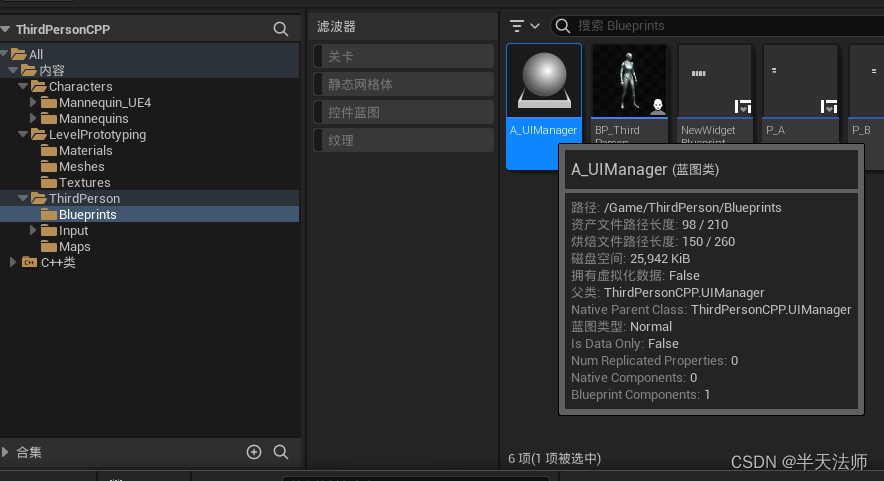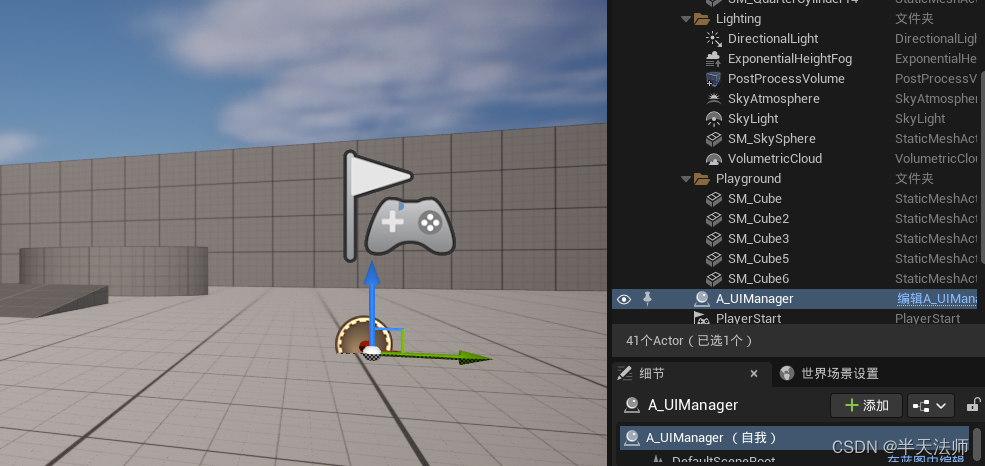需求说明:
在UE项目开发中,当UI界面较多的时候,就需要有一个管理功能出现,负责UI的生成、销毁、禁用等功能。
基于此需求,采用栈先进后出的数据接口,编写了一个简易的UI管理框架。
功能说明:
1.支持UI的自动创建
2.支持UI的按开启顺序关闭
3.支持一件关闭所有UI
4.支持开启当前UI后,禁用上一个UI的操作
5.管理类继承自AActor类,所以支持在面板配置UI信息
接口说明:
1.OpenUI:通过传入自定义的UI名来生成UI,如果hideLastUI为true,则隐藏上一个UI,否则,上一个UI继续显示
void OpenUI(const FString panelName,const bool hideLastUI );
2.CloseUI:关闭当前UI
void CloseUI();
3.CloseAllUI:关闭生成的所有UI
void CloseAllUI();
源码:
UIManager.h
// Fill out your copyright notice in the Description page of Project Settings.
#pragma once
#include "CoreMinimal.h"
#include "GameFramework/Actor.h"
#include "UIManager.generated.h"
UCLASS()
class THIRDPERSONCPP_API AUIManager : public AActor
{
GENERATED_BODY()
public:
/// <summary>
/// panelname,panel reference
/// </summary>
UPROPERTY(EditAnywhere, Category = "UIManager")
TMap<FString, TSubclassOf<UUserWidget>> panelInfos;
/// <summary>
/// panelname, panel renference path
/// </summary>
UPROPERTY(EditAnywhere, Category = "UIManager")
TMap<FString, FString> panelInfos2;
TArray<UUserWidget*> panelStack;
public:
// Sets default values for this actor's properties
AUIManager();
UFUNCTION(BlueprintCallable, Category = "UIManager")
void OpenUI(const FString panelName,const bool hideLastUI );
UFUNCTION(BlueprintCallable, Category = "UIManager")
void CloseUI();
UFUNCTION(BlueprintCallable, Category = "UIManager")
void CloseAllUI();
protected:
// Called when the game starts or when spawned
virtual void BeginPlay() override;
public:
// Called every frame
virtual void Tick(float DeltaTime) override;
};
UIManager.cpp
// Fill out your copyright notice in the Description page of Project Settings.
#include "UIManager.h"
#include "Blueprint/UserWidget.h"
#include "MyBlueprintFunctionLibrary.h"
// Sets default values
AUIManager::AUIManager()
{
// Set this actor to call Tick() every frame. You can turn this off to improve performance if you don't need it.
PrimaryActorTick.bCanEverTick = true;
}
void AUIManager::OpenUI(const FString panelName,const bool hideLastUI = true)
{
if (panelInfos.Contains(panelName) == false) return;
TSubclassOf<UUserWidget> t =panelInfos[panelName];
if (t == false)
{
UE_LOG(LogTemp, Error, TEXT("Can't find UI refence, please check"));
return;
}
//如果是第一次
if (panelStack.Num() == 0)
{
//GEngine->AddOnScreenDebugMessage(-1, 10.f, FColor::Red, FString::Printf(TEXT("A : %f"), AA));
// //UE_LOG(LogTemp, Warning, TEXT("ThreadName::::::::::::%s"), *ThreadName);
//直接生成,入栈
//根据对象生成
UUserWidget* temp = CreateWidget<UUserWidget>(GetWorld(), *panelInfos[panelName]);
//根据路径生成
//TSubclassOf<UUserWidget> clss = LoadClass<UUserWidget>(this, *panelInfos2[panelName]);
//UUserWidget* umg = CreateWidget<UUserWidget>(GetWorld(), clss);
temp->AddToViewport();
panelStack.Push(temp);
return;
}
UUserWidget* last = panelStack[panelStack.Num() - 1];
if (hideLastUI)
{
last->SetVisibility(ESlateVisibility::Hidden);
}
last->SetIsEnabled(false);
UUserWidget* temp = CreateWidget<UUserWidget>(GetWorld(), *panelInfos[panelName]);
temp->AddToViewport();
panelStack.Push(temp);
}
void AUIManager::CloseUI()
{
if (panelStack.Num() == 0)return;
UUserWidget* umg = panelStack.Pop();
umg->RemoveFromViewport();
if (panelStack.Num() == 0)return;
UUserWidget* newUMG = panelStack[panelStack.Num() - 1];
newUMG->SetVisibility(ESlateVisibility::Visible);
newUMG->SetIsEnabled(true);
}
void AUIManager::CloseAllUI()
{
while (panelStack.Num() > 0)
{
UUserWidget* umg = panelStack.Pop();
umg->RemoveFromViewport();
}
}
// Called when the game starts or when spawned
void AUIManager::BeginPlay()
{
Super::BeginPlay();
}
// Called every frame
void AUIManager::Tick(float DeltaTime)
{
Super::Tick(DeltaTime);
}
使用教程:
1.新建UIManager c++类(参照上述代码)
2.基于UIManager类新建蓝图对象

3.将A_UIManager蓝图对象拖放到关卡中

4.配置UI信息
在Panel Infos中添加ui信息,key是你自定义的UI名,value是这个UI的对象
 5.蓝图调用
5.蓝图调用
在任意位置都可以调用,打开UI时,通过传入你配置的UI名,和设置是否隐藏上一个打开的UI即可
关闭单个UI时,无需传参,直接关闭即可
关闭所有UI时,无需传参,直接关闭即可


版权归原作者 半天法师 所有, 如有侵权,请联系我们删除。